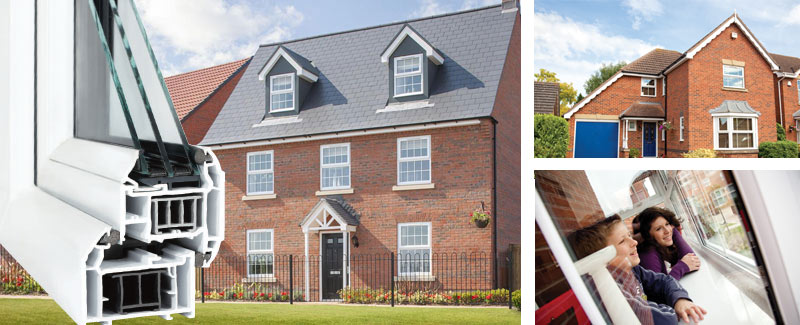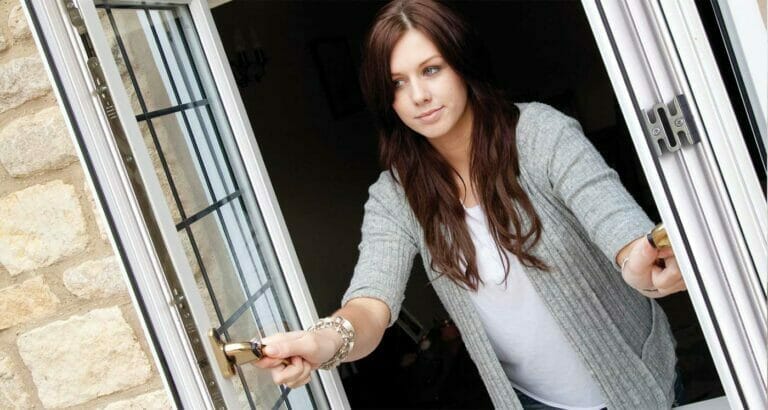Double glazing or triple glazing? That is the question on many people’s minds when they are thinking of getting their windows replaced. Hopefully, we can help with the double glazing vs triple glazing dilemma.
Your home may be situated on a busy main road, where noise reduction would be a priority for you. Or perhaps you want to eliminate drafts and lower your heating bills? Read on for the facts and figures that will help you make an informed decision for you and your home.

What Is the Difference Between Double and Triple Glazed Windows?
The physical difference between the two types of windows is actually simple, double glazing has two panes of glass whereas triple glazing, as you would expect, has three.
If you were comparing windows in this way the choice would be easy, surely it must be better to opt for three panes of glass instead of two.
But there are many additional differences between how double and triple glazing can benefit your home as well as your wallet.
Energy Efficiency
As many of you will know, one of the biggest reasons to change from single pane to double glazed windows is because of the increased energy efficiency that comes with the additional pane of glass.
So of course with triple glazing, the energy efficiency is increased again. Around a quarter of household heat is lost via windows, so to maximise the insulation here, is crucial to ensure that you are reducing heat loss as much as possible.
Heat loss from your home is measured using a U- value. On average single glazing has a U- value of 5.6, double glazing a rating of 2.8, whereas triple glazing can offer a U- value of 0.8. Easy choice really!
Not only does the extra pane of glass have its role in decreased heat loss, but the additional air gap helps too as it is usually filled with inert gas, such as argon or krypton to keep that lovely warmth inside your home.
However, it is important to remember that upgrading your windows to save energy is only one aspect that will help, energy can be wasted from many areas of the home. You will need to look at the insulation in your loft and roof space, doors and floors to ensure that you don’t waste money by only fixing one problem area.
Noise Reduction
If you live in a noisy, built-up area or on a busy road with heavy traffic, then replacement windows will greatly reduce noise levels. Whilst double glazing does help with noise reduction, triple glazing can achieve superior reductions in noise, but you must bear the following points in mind:
- The thickness of the glass is key to sound insulation. By choosing a window with different combinations of pane thicknesses (asymmetrical glazing), you can further increase noise reduction as each thickness of glass will block a different sound frequency. For the best results, the difference in thickness needs to be at least 33%. So for example one pane at 4mm and the second at 6mm. It makes no difference which is placed at the exterior.
- The size of the gap between the panes also plays a crucial role, as the larger the gap, the better the noise reduction will be.
- Trickle ventilators used on any windows will destroy the noise reduction you may have achieved with any of the above.
If you are weighing up your options between double and triple glazing for noise reduction, it is worth speaking with an expert about your particular situation and the type of noise issue you have. Whilst triple glazing is more effective in many ways it is more expensive and a double glazing solution with correct gaps and glass thickness may be sufficient for you.
Risk of Cold Patches
Damp and condensation is caused when excess moisture in the air comes in contact with a cold surface which then creates water.
Cold patches around the house will occur when there is a greater difference between the U- values of walls or floors in comparison with the windows. Walls have a U- value of around 0.3, so clearly, windows of any type have a long way to go to be as efficient as a wall. With triple glazing being the most efficient with U values between 1.8 and 0.6, this is the best option to reduce cold patches. These cold patches can lead to damp areas and problematic condensation.
Cost Comparison
When comparing any product there will always be a cost implication. As you would expect triple glazing comes with more expensive manufacturing techniques as well as containing more raw materials, so it is the more expensive option.
With both double and triple glazing, you will not see the return on your investment in terms of recouping the money you have spent on them with the reduced heating bills you will achieve going forward.
Choosing triple glazing over double glazing from a cost perspective will be because you really need the optimum in energy efficiency and comfort.
What will it be, double glazing or triple glazing?
As demonstrated there are a number of different pros and cons when it comes to choosing double or triple glazing. So depending on what your biggest requirement or priority is, will determine which window is most suitable for you.
If you are still confused about which option is right for you, call our expert team, who are here to give you a helping hand. Our team can provide you will all the information you need to help find that perfect window solution for your home.
To find out more about our windows contact the team today on 01252 414800

